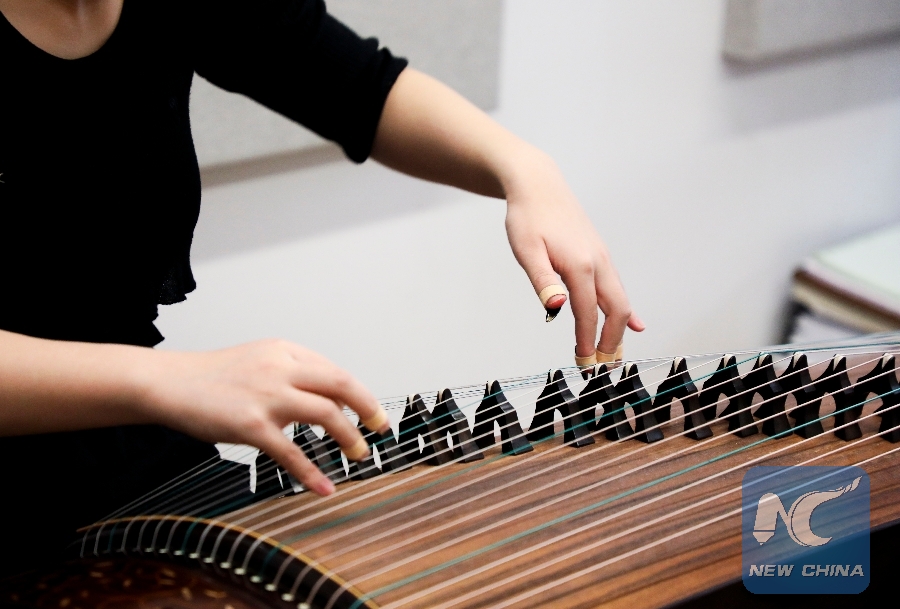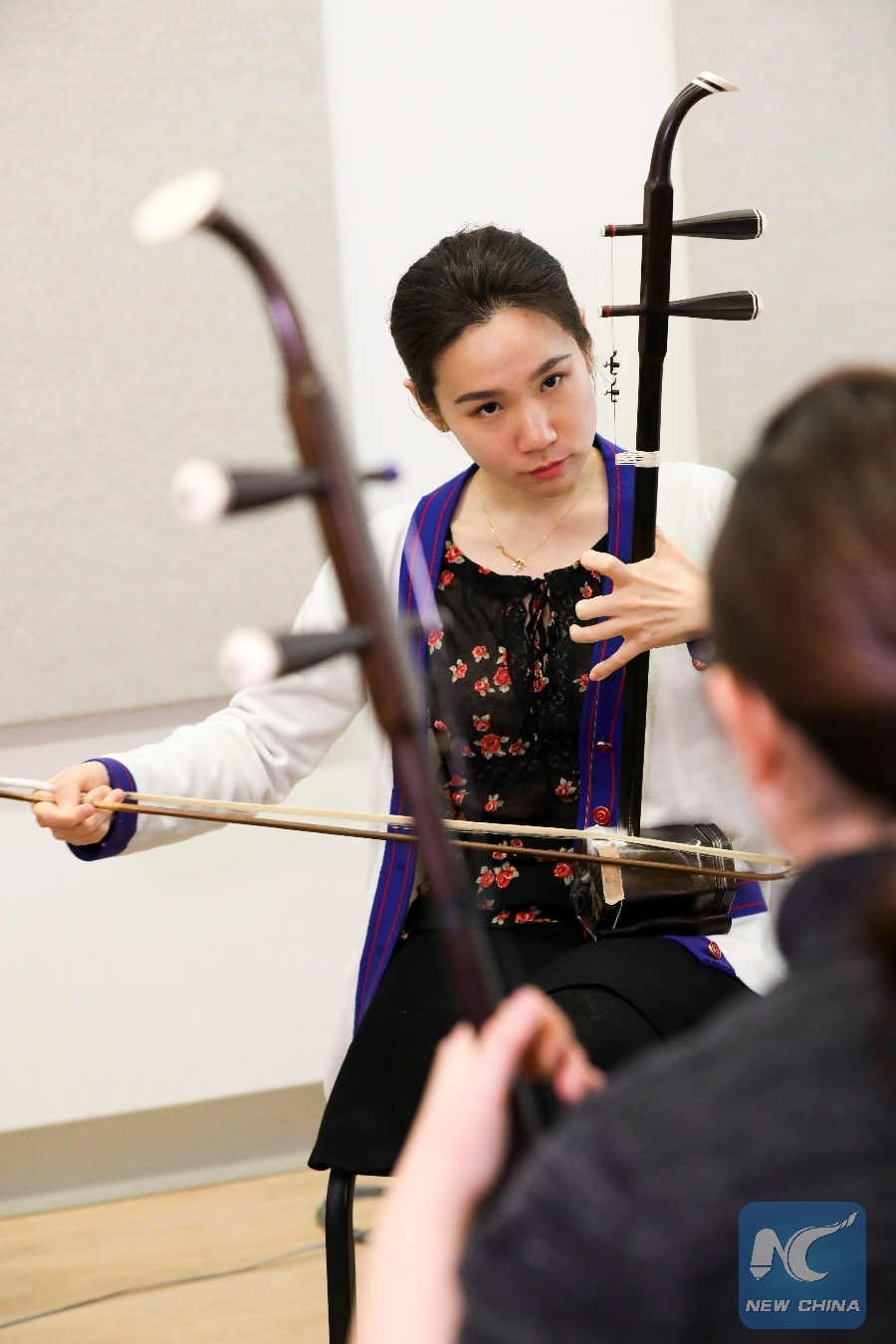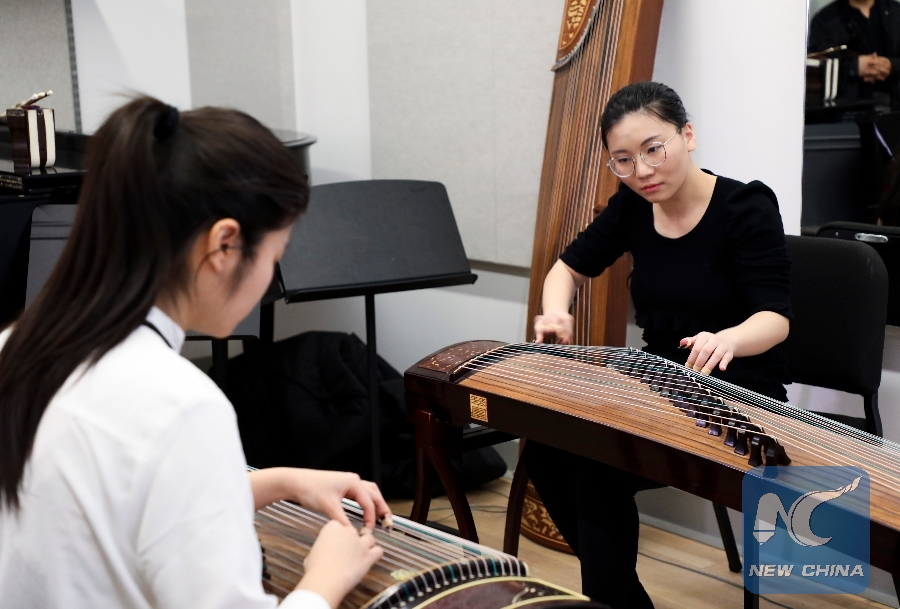
Wang Yixin, a first-year student in the double degree program of the Bard College Conservatory of Music (BCOM) and its U.S.-China Music Institute, in partnership with the Central Conservatory of Music (CCOM) in Beijing, practises guzheng, or Chinese zither, in a class at Bard College in Annandale-on-Hudson, New York, the United States, March 12, 2019. (Xinhua/Zou Guangping)
by Xinhua writers Yang Shilong, Chang Yuan
NEW YORK, March 31 (Xinhua) -- Wang Yixin believes she is now on a fast track of realizing her dream to be a master of guzheng, or Chinese zither, thanks to a pioneer Chinese music program offered by Bard College, a four-year residential college of the liberal arts and sciences located 144 km north of New York City.
Wang is one of the four first-year students in the double degree program of the Bard College Conservatory of Music (BCOM) and its US-China Music Institute, in partnership with the Central Conservatory of Music (CCOM) in Beijing.
GROUNDBREAKING PROGRAM
The program, which combines the professional study of traditional Chinese instruments with a Western-style, liberal arts education, offers a groundbreaking, undergraduate performance degree program in selected Chinese instruments including erhu (urheen), guzheng and pipa.
Studio instruction in these traditional Chinese instruments will be provided by world-renowned CCOM master musicians, using state-of-the-art video conferencing facility as well as in-person lessons both on the Bard campus and in Beijing.
"I felt lucky I can continue to study the Chinese instrument here thanks to the program, the first of its kind in the U.S. I believe," Wang said in a recent interview with Xinhua on the Bard campus in Annandale-on-Hudson.
The young girl started to play the centuries-old instrument at the age of three in China yet stopped studying it systematically since she moved to Houston, Texas, with her parents around 2012.
"There is an increasing interest in Chinese music in the country. Many American children, not only those of Chinese origin, are tending to learn Chinese instruments. I see great career opportunities," she said.

Li Cangxiao (back), an erhu (urheen) teacher in the double degree program of the Bard College Conservatory of Music (BCOM) and its U.S.-China Music Institute, in partnership with the Central Conservatory of Music (CCOM) in Beijing, demonstrates erhu technique for a student, at Bard College in Annandale-on-Hudson, New York, the United States, March 12, 2019. (Xinhua/Zou Guangping)
Wang and her BCOM peers graduate with a bachelor of music degree, majoring in the performance of a Chinese instrument, and a bachelor of arts in a field other than music.
"This is the another reason Bard attracted me. I chose Math as my second major. I'll have an alternative choice even it's not easy to find a job as a guzheng player upon graduation. At least it helps alleviate my parents concerns about my future," Wang smiled.
TO BUILD ON
The unique and comprehensive platform makes Bard the leader in Chinese music education in the United States, said Robert Martin, BCOM director.
"Well, we're very thrilled ...the most important thing is the ongoing process. So even though it's only four students who came, now it's real," Martin, a cellist told Xinhua.
"They're playing their instruments, they've made a difference. And it's so important for the rest of the music students and for the whole college to see this.
"It's a new kind of music for our ears, for the ears of the students at Bard. And it's a great experience. So we're hoping to build on it. We are recruiting now for the next group," Martin said.
"I hope we have maybe eight next year, maybe more, and to keep building. We want to make sure we will learn from these students how it works for them," Martin said.
Cai Jindong, director of BCOM's US-China Music Institute, agreed with Martin.
The 2019-2020 double degree program include students majoring pipa, ruan and dizi (flute) in addition to guzheng and erhu, said Cai, who has been a guest conductor of major symphony orchestras in both China and the United States.
"I hope we could have 20 to 30 students in five years, thus establish a Chinese orchestra which will enrich the program itself," Cai said.
The BCOM-CCOM initiative also consists of an annual Chinese music festival, seminars and scholarly conferences on Chinese music, art, and social development.
The second annual conference, which took place in mid-March, was themed "Tradition and Discovery: Teaching Chinese Music." Dozens of educators and performers from the United States, Canada and Europe attended the two-day event.
"Chinese instruments and music are finding more and more audience in the West, yet there is a serious shortage of teachers and textbooks," Cai said. "The conference aims to set up a platform for educators, performers to share their experiences and inputs in further promoting Chinese music in Western countries."
"When I heard that there was this conference, I was very interested because it's anew, it has not been done. And not many institutions are aware of the diversity of cultures and of the richness of Chinese music. So I decided to come," said Xavier Bouvier, a professor at Geneva University of Music.
UNIVERSAL IMPULSE
Calling the Bard project "trailblazing step" for Chinese music going worldwide, Yu Feng, CCOM president said it is creating a new channel for cultural exchange between the two countries.
"Traditional Chinese culture is the basis of Chinese music and Chinese instruments," Yu said, adding the art of music, calligraphy, chess and poetry are "four core qualities" a traditional Chinese intellectual must have.

Wang Yixin (R), a first-year student in the double degree program of the Bard College Conservatory of Music (BCOM) and its U.S.-China Music Institute, in partnership with the Central Conservatory of Music (CCOM) in Beijing, practises guzheng, or Chinese zither, in a class at Bard College in Annandale-on-Hudson, New York, the United States, March 12, 2019. (Xinhua/Zou Guangping)
For the past 400 years, there has been much development regarding the absorption of the teaching of Western instruments and Western music in China, Yu noted.
"The growth and flourishing of the Chinese music in the West will also inspire young musicians of the next generation in both China and West," he said.
"Music is not only an international art, but it is an international impulse," Bard College President Leon Botstein said in his address to the education conference.
"All human beings are musical. Whether it's in China or the states, whether it's in Florence or whether it's in Mississippi, people all have the impulse to make music and to communicate with music," said Botstein.
This is a "no better time to make this exchange and this collaboration happen" when there's some political tension, economic tension between the United States and China, Botstein said.
"I hope others will to follow our lead and create programs here. I'm very encouraged the Central Conservatory has reached out to us and formed a wonderful partnership. So I think institutions, in the arts especially, are able to do this kind of thing," Martin said.
"And we just need to keep it up. More energy, more students and the students will teach each other. They will form friendships, they will do things that we don't even imagine. That will be really great for the future of our countries," Martin said.
"Many Westerners don't know about China. Sometimes there are misrepresentations and the only thing people like me can do is to act as a bridge between the country and to try to explain to Westerners how it is. So this is what we are trying to do using music in my case," said Bouvier.
(Xinhua reporters Zhou Sa'ang, Zou Guangping in New York also contribute to the story)

